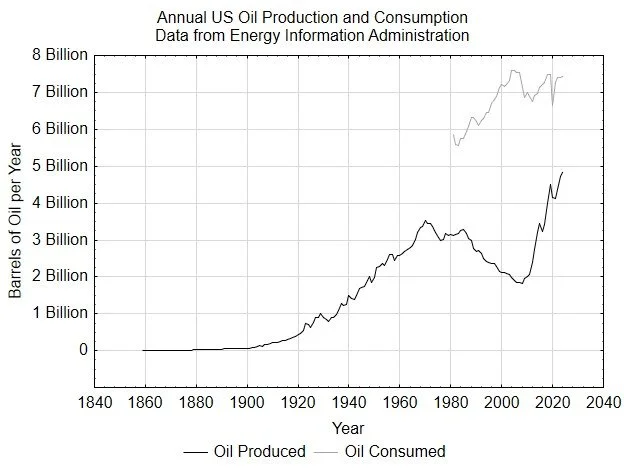Oil
In Chapter 15, the members of the salon discussed oil, explaining the concept of peak oil. In this post, the graph from that chapter will be updated to the most current information.
There was a time when peak oil was discussed frequently, with arguments on both sides of the issue. Sidestepping the issue of humanity’s collective daily effort to convert hydrocarbons locked in the ground into carbon dioxide that is changing our climate while we watch, the focus here will be on how long we have until there is not enough oil to maintain our society.
I think the first question to ponder is whether the Earth has an infinite amount of petroleum so that no matter how many people we have and no matter how much oil we all use, we will never run out. The oil companies are always searching for more, but will the petroleum they find be sufficiently accessible at prices that will not send the economy into a tailspin once it is converted to gasoline? We certainly know how whiney people are about higher gas prices. If the supply is not infinite or renewable, then it can be exhausted. Once the peak production is passed, then no amount of wishing will give us enough oil to meet the needs of a growing population, now over 8 billion strong worldwide and over 340 million in the US. A look at the graph at Our World in Data shows that we have not yet passed the peak. You can play with this graph by adding countries to see how production compares.
We know when we fill our tank at the pump, eventually it will be empty and we will need to fill the tank again. We can think of the Earth as having given us a full tank of petroleum, but once it is empty, there is no way to refill it. If you have ever been on E and had that sinking feeling in your gut about whether you’d make it to the next gas station before running out of gas, imagine the gravity of the situation when the oil companies can no longer produce enough at affordable prices. With that in mind, there are two questions we should ponder.
Why are we trying to exhaust the US supply of petroleum now, rather than save it for when the rest of the world can’t provide enough?
Why isn’t there a focus on energy in schools? In particular, it seems that hydrogen has the potential to be the fuel of the future. Granted, there are still many hurdles to overcome, and that takes time, but wouldn’t it make sense to put in that effort now, while we still have enough petroleum, rather than wait until we don’t? What can schools do to help find solutions by unleashing student’s creative potential? Would an inter-school competition focusing on just one hydrogen related problem inspire some students? What about having hydrogen as a theme for a class that integrates math, science, history, and other disciplines around this theme?
Perhaps the problem of induction mentioned in Chapter 5 is relevant here. Will the future look like the past with which we are familiar (cars, gas, occasional spikes in gas prices, oil changes) or will transportation with be very different? I think one of the issues we face is whether to look backwards or toward the future. Fueling society with fossil fuels is the present, and has been the past for over a century, but given long-range supply issues and its affect on the climate, it will not be the fuel of the future. But a change like this will take time, perhaps decades. The longer we wait to start, the longer until we have solutions. If you want more information about hydrogen, or energy, visit the IEA website (International Energy Agency). According to their site, China and India are investing in hydrogen electrolysis and other technologies with reduced emissions. If the US doesn’t engage and remains committed to petroleum, then we may be conceding the advantage to those countries.
Voting
In Chapter 9, the topic for the salon was voting, and readers were introduced to the STAR voting system. Since most people are unfamiliar with it, you can participate in a vote using it, to determine if you like it. Results will be provided when enough people have voted. There is nothing official at stake, so please vote only once. This is about learning a voting system, not which option wins.
The question: Which approach should schools take to prepare for a world with insufficient petroleum?
Have students write letters to state and federal representatives urging policy changes that support the hydrogen, wind, and solar industries.
Offer a themed course on energy that integrates math, science, history, etc.
Do nothing, protect our students and teachers from such a pessimistic possibility.
Have fairs (like science fairs) so interested students can create solutions to energy problems.
Ridiculous, there will always be enough petroleum so there is no need for this issue in schools.
Follow this link to go to a Google Form to vote. Vote Here

